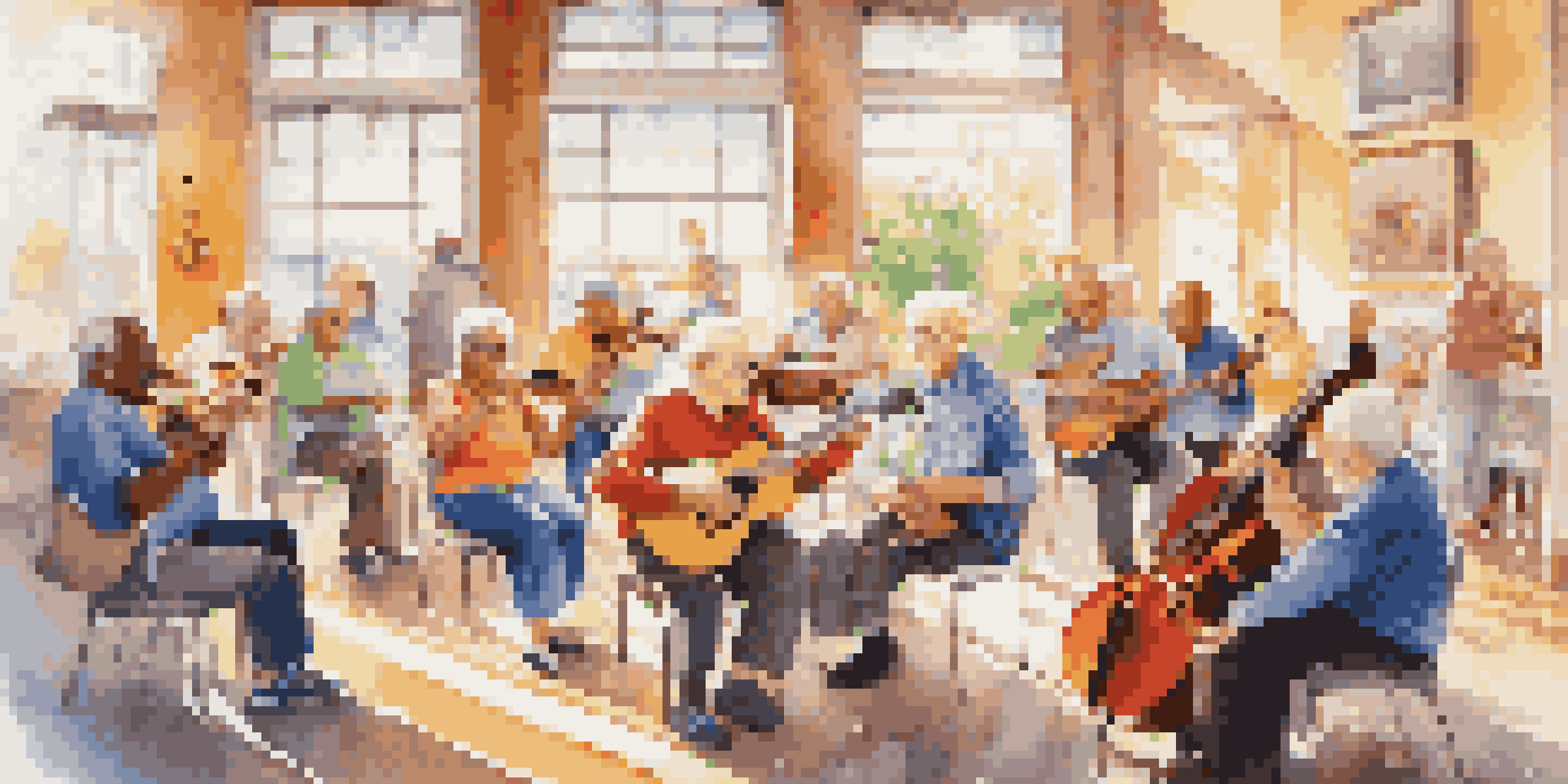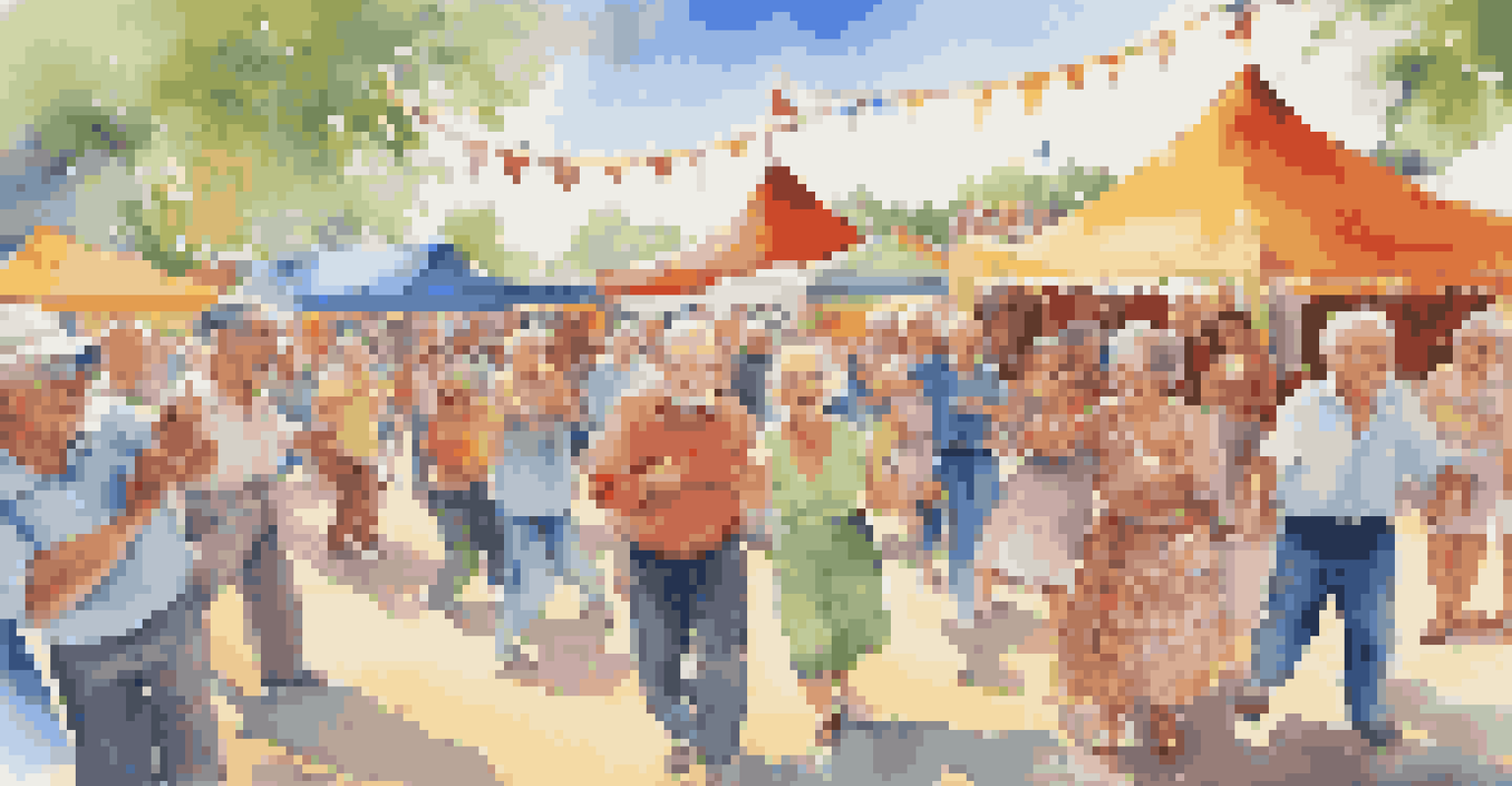The Benefits of Music Participation for Aging Individuals

Music Participation Enhances Cognitive Function in Seniors
Engaging with music can significantly boost cognitive function in aging individuals. Studies show that playing instruments or singing can stimulate areas of the brain associated with memory and learning. This activity keeps the mind sharp and may even slow down cognitive decline, making it a fun way to stay mentally active.
Music can change the world because it can change people.
For example, joining a choir or taking part in a music class encourages social interaction, which further enhances cognitive engagement. When seniors share their musical experiences, they reinforce neural connections while also building new ones. It’s like a workout for the brain, but with a melody!
Moreover, learning new pieces or rhythms challenges the brain, promoting neuroplasticity—the brain's ability to adapt and grow. This means that not only are they enjoying music, but they're also giving their brain a beneficial exercise that could lead to improved memory and problem-solving skills.
Music Fosters Emotional Well-Being in Older Adults
Participating in music can serve as a powerful emotional outlet for aging individuals. Music has the unique ability to evoke memories and feelings, which can be particularly comforting during times of loneliness or sadness. Singing familiar songs can reignite cherished memories and foster a sense of joy.

Consider a group of seniors who gather weekly to play music together. The laughter and camaraderie they share not only lifts their spirits but also creates a supportive community. This social aspect is crucial, as loneliness can have detrimental effects on emotional health.
Music Boosts Cognitive Function
Engaging with music enhances memory and learning in seniors, promoting brain health and neuroplasticity.
Additionally, engaging with music can help reduce anxiety and depression. Research indicates that listening to or creating music releases dopamine, the 'feel-good' hormone, which enhances mood and overall happiness. So, whether it's a solo session or a group jam, the emotional benefits are profound.
Physical Benefits of Music Participation for Seniors
Surprisingly, music participation also has physical benefits for aging individuals. Activities like dancing or even conducting can improve motor skills and coordination. These physical movements not only enhance balance but also contribute to overall fitness, making it easier for seniors to stay active.
The music is not in the notes, but in the silence between.
For instance, a simple rhythm exercise can encourage seniors to move their bodies in time with the music. This not only keeps them physically engaged but also motivates them to participate regularly, leading to improved physical health over time. Think of it as a fun way to sneak in some exercise!
Moreover, music can also aid in pain management. Research has shown that listening to music can reduce the perception of pain, making everyday tasks less daunting. This combination of physical activity and pain relief makes music participation a win-win for seniors.
Social Connections Through Music for Aging Individuals
Music has a unique way of bringing people together, and this is especially true for aging individuals. Participating in musical activities creates opportunities for social interaction, which is essential for emotional and mental well-being. Whether it's joining a band, attending concerts, or participating in community sing-alongs, music fosters connections.
Imagine a local community center where seniors gather for a weekly jam session. Not only are they making music, but they are also forming friendships and support networks. These connections can combat feelings of isolation, which are common among the elderly.
Music Fosters Emotional Well-Being
Participating in music serves as a powerful emotional outlet, reducing feelings of loneliness and enhancing mood.
Additionally, sharing musical experiences can bridge generational gaps. When seniors engage with younger musicians or students, it creates an enriching environment for both parties. This intergenerational interaction not only enhances social connections but also fosters mutual respect and understanding.
Music Encourages Lifelong Learning in Aging Individuals
One of the beautiful aspects of music is that it offers endless opportunities for learning. Aging individuals can take up new instruments or explore different genres, keeping their minds active and curious. This pursuit of knowledge is vital for personal growth and satisfaction throughout the aging process.
For example, a senior might decide to learn the guitar after retirement. This not only provides a new skill but also challenges them to think creatively and stay engaged. Learning music theory or practicing new songs can be incredibly fulfilling.
Furthermore, lifelong learning through music helps to build resilience. As seniors navigate the challenges that come with aging, having a skill to focus on can provide a sense of purpose. Music becomes a tool for self-discovery, allowing individuals to express themselves and explore their capabilities.
Therapeutic Benefits of Music for Seniors
Music therapy is a recognized approach that uses music to address emotional, cognitive, and social needs in aging individuals. Trained music therapists can tailor sessions to help seniors process emotions, improve communication skills, and even manage illnesses. It's a holistic approach that can enhance quality of life.
For instance, individuals with dementia may respond positively to familiar tunes, sparking memories and interactions that might otherwise be lost. This therapeutic aspect of music can be incredibly powerful, providing comfort and connection in challenging times.
Music Builds Social Connections
Musical activities create opportunities for social interaction, helping seniors combat isolation and form supportive networks.
Additionally, music therapy can promote relaxation and reduce stress, making it a valuable tool for seniors facing anxiety or depression. The soothing power of music can create a calming environment, allowing individuals to find peace and solace.
Music Participation: A Gateway to Cultural Appreciation
Engaging with music can also open doors to cultural exploration for aging individuals. Whether it’s learning about different musical traditions or attending cultural performances, music provides a rich tapestry that connects people to their heritage and the world at large. This exploration can be both educational and enriching.
Consider a senior who attends a world music festival. Not only do they enjoy various performances, but they also gain insights into different cultures and histories. This exposure can foster a sense of belonging and appreciation for diversity, enhancing their worldview.

Moreover, exploring music from different cultures can inspire creativity and self-expression. Seniors may find themselves drawn to new instruments or styles, creating a delightful journey of discovery that keeps their spirits high and their minds engaged.